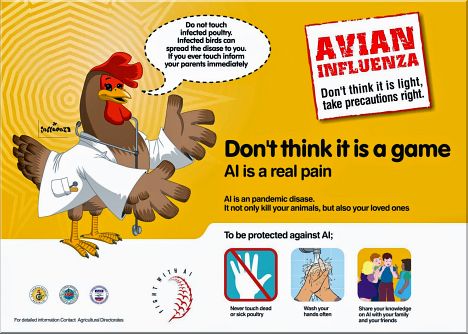How to Prevent and Manage Avian Influenza

Bird flu is a common disease among chickens, ducks, and other poultry. This virus has evolved over time, and has now been found in humans. Humans do not have natural immunity to the disease, and complications can be serious, including death. Therefore, it is important to treat any symptoms of bird flu as soon as possible. Here are some tips for preventing and managing the infection. These can help you avoid contracting the deadly illness.
The first human cases of avian influenza were reported in China in 2013. The disease is a respiratory illness caused by a subtype of the influenza virus called H7N9. It was discovered over 100 years ago in Italy and now occurs throughout the world. Although the symptoms are similar to the ones of human flu, there are two different types of avian influenza: highly pathogenic and low pathogenic. The high pathogenic form is very contagious and causes rapid death.
There are three main types of avian influenza viruses: Type A and type B. These strains can infect humans, birds, and even rodents. Infecting humans is a high risk because influenza viruses can change quickly and spread through contact. Because of their heightened pathogenicity, special precautions should be taken when dealing with these diseases. Treatment should include oseltamivir or zanamivir, which are both available in pharmacies.
Avian influenza is easily transmitted through saliva, nasal discharge, and feces, so it is important to kill infected birds to prevent spread. There are different types of bird flu strains, the most common of which is the H5N1 strain. Once the virus has infected a person, symptoms can range from typical flu-like symptoms to eye infections and pneumonia. Some people may experience several of these symptoms or even be completely wiped out.
There are two subtypes of bird flu. The H5N1 avian influenza virus causes disease in humans. The H5N1 subtype was first identified in Hong Kong in 1997 and was the most common in the country. It is the H5N1 virus that can cause the most severe infections in both birds and humans. Avian influenza subtypes are the A3N1 and H9N1 viruses.
Some strains of bird flu can be fatal. If you have been in close contact with chicken, the H5N1 strain has the highest risk of causing disease in humans. Symptoms of this type of bird flu can range from the typical flu to eye infections and pneumonia. Some people may have no symptoms. Site https://productossaludes.com/
reminds that symptoms will depend on the strain of bird flu infected.
When a person has an avian influenza virus infection, it is important to recognize the symptoms. Symptoms of avian influenza include cough, high fever, and sore throat. In some cases, patients also experience abdominal pain, bleeding in the gums, and encephalitis. The virus can also result in multi-organ dysfunction and septic shock. The disease is infectious to humans. However, the symptoms of avian influenza vary from one patient to another.
The symptoms of avian influenza are usually mild or non-existent. However, some cases can result in serious health complications. In some cases, the illness may lead to death, especially if it is severe. There is a risk of septic shock and mortality in humans infected with avian influenza. It is important to contact a doctor immediately if you suspect you have avian influenza. There are several ways to do this.
Viruses that cause avian influenza are highly pathogenic. This is a virus that causes disease in birds and can cause fatal illness in humans. The most common type is H5N1 and causes severe illness in chickens. This strain of virus can also be passed from pigs to humans. This is the virus that causes avian influenza. These viruses are often very dangerous and can lead to the death of an entire flock.
When it comes to transmission, avian influenza is usually transmitted directly from wild to domestic birds. If you live in a place where you keep domestic birds, your risk of exposure to avian influenza is increased. If you work in a profession that involves exposure to infected birds, you are at a higher risk of getting infected. Infection from avian influenza can be spread through contaminated material.